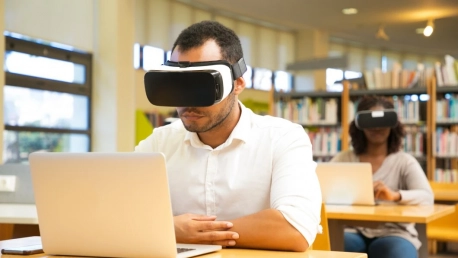In Nigeria, the advent of Augmented Reality (AR) and Virtual Reality (VR) is set to ignite a transformative wave in the education sector. These innovative technologies are breaking the barriers of conventional learning methods by offering immersive and engaging educational experiences. AR and VR not only complement existing teaching practices but are also shaping a new educational paradigm to equip Nigerian students for the technologically driven world.By integrating AR and VR into the educational system, students can interact with complex concepts in a more concrete and relatable way. This hands-on approach not only enhances understanding but also spikes motivation and participation among learners. The potential of these technologies to bridge educational gaps is immense, offering experiential learning that can transcend traditional classroom boundaries and foster a deeper connection with the material.As the world evolves, the Nigerian educational sector is at a pivotal juncture to leverage AR and VR to redefine the learning landscape. By doing so, it positions itself to mold a future workforce that is not only tech-savvy but also more prepared for the challenges and opportunities of a digital age. The integration of AR and VR is thus an essential step toward reinforcing the country’s educational foundations and steering students toward unprecedented levels of digital proficiency.
Shifting from Passive to Interactive Learning
Traditional lecture-based learning is giving way to interactive and immersive educational experiences with the advent of AR and VR in Nigeria’s classrooms. As the country’s youth population burgeons, there’s an increasing need for educational strategies that don’t just transfer knowledge but also inspire creativity and engagement. AR and VR are stepping into this gap, transitioning students from passive recipients of information to active participants in their own learning process.Virtual Reality has the power to transcend physical borders, allowing Nigerian students to embark on virtual field trips to historical sites, laboratories, or even galactic expeditions, without leaving their classrooms. AR, on the other hand, brings complex concepts to life right in front of students’ eyes, heightening their grasp of difficult subject matter. By overlaying digital information onto the real world, AR converts abstract elements into concrete, interactable formats, significantly improving comprehension and retention.
Enhancing Skills for the Future Job Market
With Nigeria’s job market evolving at a brisk pace, the necessity to nurture a workforce equipped with modern skills is pressing. Herein lies the strength of AR and VR – these technologies are perfect springboards for fostering vital problem-solving, critical thinking, and collaborative skills within educational contexts. By simulating realistic challenges, AR and VR encourage students to engage deeply, think critically, and work together to find solutions.In VR settings, students can practice procedures or perfect techniques in a risk-free environment, preparing them for real-world applications. The immersive nature of these simulations facilitates a shift from theory to practice, enabling students to demonstrate proficiency in ways traditional assessments could never measure. This hands-on approach not only ingratiates students with future workplace technologies but also allows for a more nuanced evaluation of their skills.
Industry Applications in Education
The interplay between industry and education in Nigeria is giving rise to innovative curriculum approaches that integrate AR and VR technologies. This synergistic relationship sees industries such as healthcare, manufacturing, and agriculture harness AR and VR for practical training. Through such collaborations, students gain firsthand exposure to industry-relevant experiences that enhance their employability.These alliances are particularly beneficial for technical and vocational education where the insight into cutting-edge practices can be pivotal. Nigerian students who are trained using AR and VR are likely to stand out in the job market, offering skills and familiarity with technologies that are becoming standard in many professional settings. This practical edge helps to bridge the gap between academia and industry demands, furnishing future professionals with the tools they need to thrive.
Overcoming Adoption Challenges
The journey to integrate AR and VR into Nigerian education is not without hurdles. High costs, technology accessibility, educator proficiency, content creation, and health and safety concerns are significant barriers. To effectively leap over these hurdles, strategies such as government investment, infrastructural support, and private-sector partnerships are essential.Initiating comprehensive training programs for teachers is central to the successful deployment of AR and VR. Ensuring educators are well-versed in these technologies guarantees they can guide and facilitate immersive learning experiences. Furthermore, creating localized and relevant content will be key in driving student engagement and ensuring these technologies are not seen as foreign intrusions but as valuable tools for learning enhancement.
Looking Towards the Future
The trajectory for AR and VR in Nigerian education is set toward a horizon replete with possibilities. With technological advancements gearing up to expand accessibility, the future looks promising for these innovative learning modalities. The next educational revolution in Nigeria envisions a seamless integration of AR and VR into curricula, enriched teacher training programs, and robust collaborations with industry.The thrust into the future with AR and VR will continue to unveil novel domains of application, bringing about an educational paradigm that is diverse, inclusive, and inherently future-facing. As Nigerian education aligns itself with the technological march, it aspires to produce a cadre of students who are not only ready for the job market of today but are also the architects of the job market of tomorrow.









